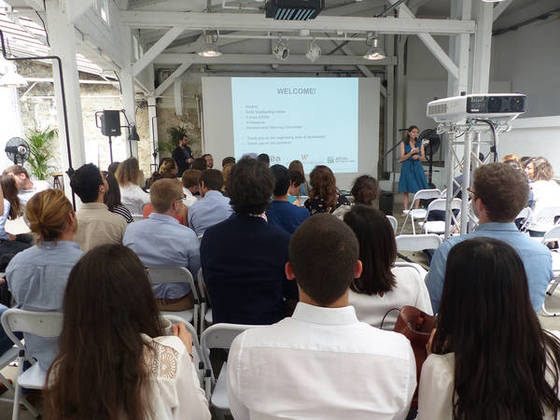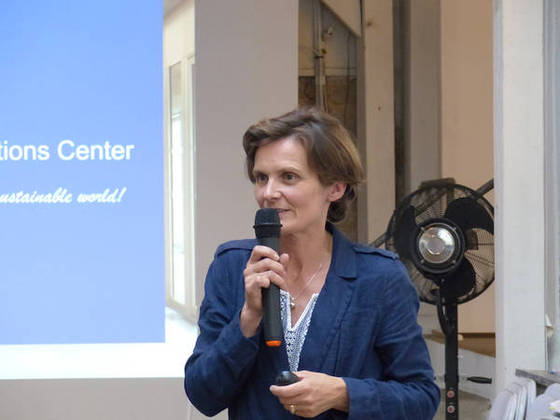Landmark SASI Degree Celebrates 15 Years of Development with Forward-Looking Workshops
One of HEC’s key Master degrees, the MSc in Sustainability and Social Innovation (SASI) marked its 15th birthday on June 13 by uniting old and new generations around workshops, debates and social exchanges. Set in the impressive Quartier Général, central Paris, the occasion was a powerful moment to take stock and look to the future of a program that works hand-in-hand with school’s Society & Organization (S&O) Center.

“SASI’s roots go back to 2003 and the creation of a program called Master in Sustainable Development ,” explains Lise Pénillard, the program’s Executive Director. “The context at the time was different. Integrating sustainability at the core of business models and organizations was still an emerging concept. The HEC professors and their students were pioneers in these fields.”
Pénillard is quietly reflective as she takes a break from the debates that are ping ponging back and forth inside the beautifully restored warehouse in one of the capital’s most popular neighborhoods. She continues: “A few years later, Eve Chiapello instigated HEC’s Alternative Management Major which developed a critical analysis of our capitalist system and organizations. When the two programs merged in 2015, the SASI Master was born, bridging these two approaches, critical and pragmatic and designed to build new models for social impact .” The former Director of Planète d’Entrepreneurs, an NGO helping social entrepreneurs around the world measure their social impact, has been quietly effective at SASI’s helm. “Today we are proud that the SASI ecosystem and participants have contributed to the debates on responsible managerial practices, sustainable business models, mission-led companies , etc. developing significant inroads in the broader HEC ecosystem and corporate world”
Indeed, social responsibility in business has also become one of HEC Paris’ strongest priorities. The business school has enjoyed the fruits of SASI’s experimentations as the MSc program encourages courses that have become laboratories for innovation with models designed to juggle both business profit and principles of sustainability, fair trade and professional well-being.
The Long Road from 2003 to 2018
One person who has enjoyed this evolution is Olivier Menuet, the President of SNCF Energie at the SNCF Group for Energy hedging and procurement. He is one of SASI’s longest serving teachers: “It’s been a fabulous journey. I’m so proud to have been able to share my vision on sustainable procurement and responsible energy with these students ever since I began in 2004. I can’t believe how the degree has evolved since I joined its teaching staff 14 years ago.” Menuet beams with satisfaction. In front of him, dozens of graduates from the SASI degree busy themselves in workshops on the major questions of our times: how do we accelerate the transformation of our businesses? How can we integrate ESG (Environment, Social and Governance) considerations into corporate decision-making? Which partnerships can be created to scale the transition of our economies? And how can we all impact changes in behavior, systems and organizations?
These preoccupations catalyze much of a day essentially devoted to celebrating the growth of a body of thought which has over the years become one of the strategic pillars, not only for HEC Paris, but also for major ranking institutions of business schools worldwide like the FT. Menuet was one of the two stalwarts from the very first years of this degree present at the Quartier Général. “At the time, the student composition was light years from what we see today,” he confides. “It brought together essentially French students with radical anti-globalization convictions. The world was a different place, of course, these students were very much out of sync with mainstream society and had few tools to implement their dreams.”
More Meat Needed on the Sustainability Bone
Fast-forwarding to 2018 and this expert in energy strategy and management describes a transformed SASI student body, born of 17 nationalities, with strong corporate experience. Menuet sees them as leaders with grounded visions thanks to essential tools such as alternative business models and entrepreneurial strategy. “These professionals are key changemakers, the kind we need to drive our society towards a better world,” he says emphatically.

A person with an even longer experience of SASI’s story concurs with this vision. Bénédicte Faivre-Tavignot was the co-founder of the 2003 Master in Sustainable Development and currently holds the post of Executive Director of the S&O Center. “ We are a source of differentiation,” she tells the event’s participants “We have always had a clear mission: to build an innovative education ecosystem empowering students as changemakers. For that we explore ways to provide the necessary critical thinking, leadership and hard skills to rethink, innovate and shape sustainable organizations in the world of tomorrow.”
Jeremy Ghez took the post of SASI’s Academic Director in September 2017 but already his vision of its impact is admirably long-reaching and shows a clear grasp of the program’s guiding role: “At the heart of our identity are two concepts,” he tells those gathered in the opening exchange, “one is disruption: we are actors of disruption, aiming to create a more circular, inclusive economy, so buckle your seatbelts, this is going to accelerate. Secondly, the SASI represents a form of anger at a model which is not sustainable and must change. Let’s not delude ourselves,” Ghez continues, “this is a terrifying world for all of us, including me. As a teacher, a citizen, a father, I worry about the downward spiral we’re caught in. That’s why this degree is so vital: it tries to imagine and implement an alternative, to generate valuable new sources. But we need to put more meat on this bone.”
Variegated Paths taken by SASI Alumni
Which is precisely what the participants at the Quartier Général aimed to do in the course of lively afternoon workshops guided by seasoned HEC academics, entrepreneurs and graduates. Partial SASI statistics reveal that over a quarter of the Alumni have been hired for “SASI-related” work, whilst a further 23% are consultants in socially-based sectors such as health, education, etc..
The openings have been diverse: 2017 graduate Victoria Reca is an inclusive business consultant in the global firm specializing in inclusive business, Hystra. This consultancy develops business models to help multinationals leverage income and encourage a better balance between entrepreneurship and social business. 2018 Alumnus Matteo de Vos is challenging the perception of millennials on the farming world with his Original Foodies project. Fellow graduate Alexandre Kremer, meanwhile, is tackling plastic pollution in the oceans with Systemiq. The company Associate evolved from chemical engineer to consultant in a company aiming to eradicate the endemic crisis. He attributes his transformation to the SASI experience. “Our studies encouraged us to re-invent the world, to propose business models that invest in renewable energy, circular economy, different approaches to land and ocean masses.” Kremer is soon to move to Indonesia as part of his work on ocean plastic mitigation strategies in Southeast Asia.
“Build Sustainability or We Die”
Over the past 15 years, newly-recruited SASI mentor Etienne Benoist’s career has followed a meandering course, going from a Wall Street trader to co-founder of a holding company engaged in plant-based food tech, via a consultancy job in Kinshasa for the World Bank. His latest venture, AV Group, owns one of Paris’ most promising restaurant laboratories, L’Abattoir Végétal. On his return from the DRC, the 2003 HEC graduate was convinced by Lise Pénillard to share his professional experiences with SASI students. At the anniversary event, he insists on the open-minded approach of the students. “I described my policy-making experiences in the sectors of climate change, biodiversity, land tenure and indigenous communities and it went down very well. I think the students liked my no-bullshit, straight talking. I wasn’t there to sell the World Bank, quite the opposite, I pinpointed the deep fault-lines it has, and they appreciated the honesty.”
A total of 729 people have gone through the ranks of SASI, a steady rise since it began under another guise in 2004 with just 17 predominantly French students. At the anniversary gathering, two younger heads sheepishly followed the proceedings, slightly agog at the feverish exchanges over keywords like “hybrid”, “durability”, “collaborative”, “impact”, “sense” and “complementarity”. They are part of the latest batch of recruits, about to swell the student numbers further at the start of the next school year. “I’m really taken by the scope of the program,” confided Yago Martinez, with a smile. “You can see that the academics have a strong belief in breaking the codes in business, they are very inspiring. The Master is considered the most progressive at HEC Paris, but it’s just another way of saying the school is conscious of the problems the world has to face up to in the future and that we mean to do something about it.”
Words that go some to answering the plea by Mathilde Grosgogeat, HEC graduate 2014, who works for the Swiss luxury goods company Richemont as a chemical compliance coordination supervisor. “I’m facing big challenges in integrating sustainability in each business project just now,” she told the audience. “For big business it remains a question of compliance or philanthropy, not social responsibility. Yet sustainability is at a critical crossroads. It is urgent that we develop it. If not, this planet is going to die.”
A warning which clearly did not fall on deaf ears at the Quartier Général with current and future actors of change devoting their energy to developing paradigms and challenging the status quo.